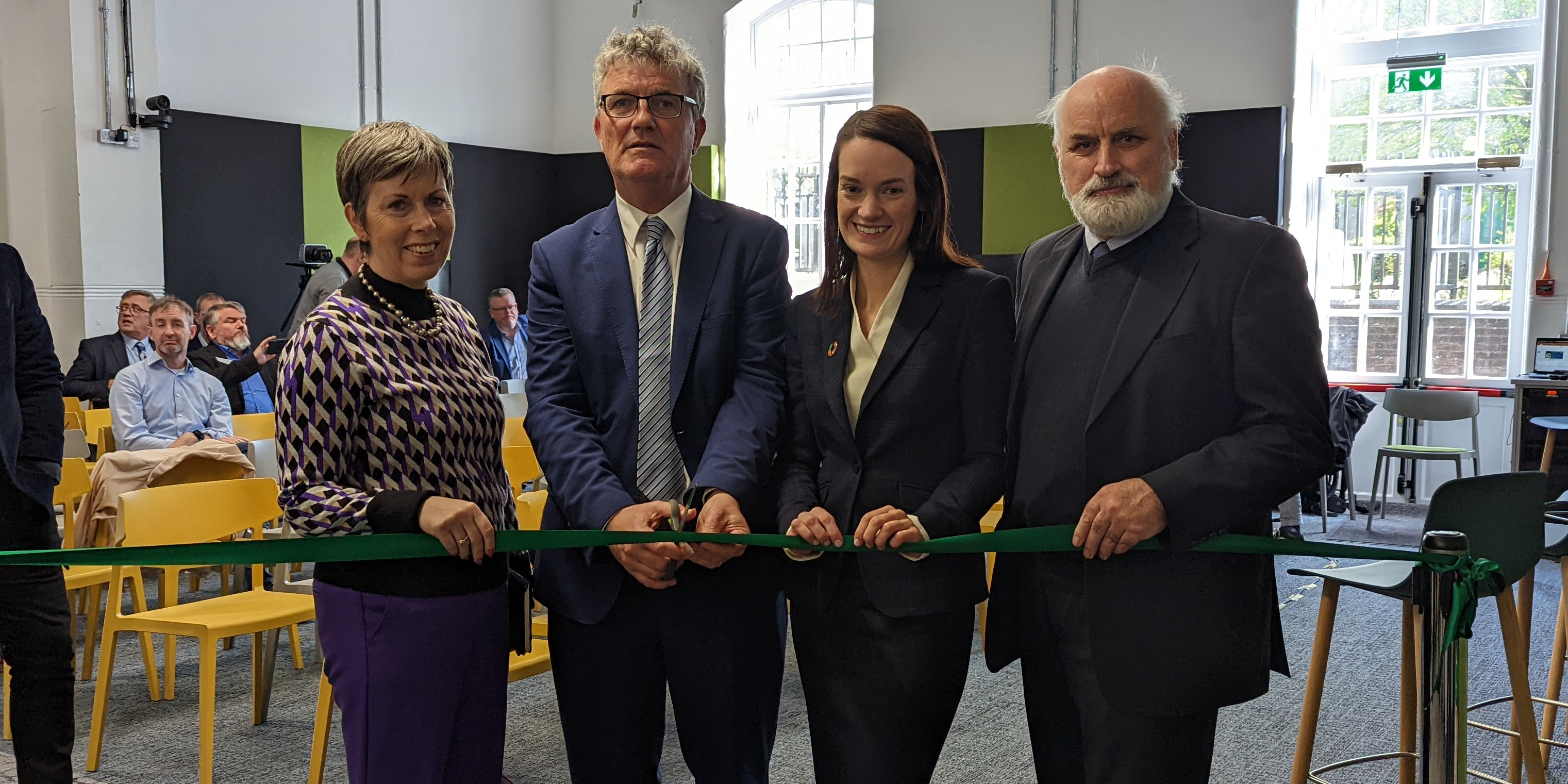€3.9m UCC Sustainable Futures project launched

- Higher education institutes join forces with enterprise partners to co-develop educational programmes focused on sustainability, decarbonisation, circular economy and business leadership.
- Significant €3.9m Sustainable Futures project is led by University College Cork in collaboration with Maynooth University and Atlantic Technological University.
- Industry partners include Microsoft, Carbery Group, Mannok Holdings, Glenveagh Properties, Musgraves, Logitech, PM Group, Glanbia, Kepak, CIE Group, EirGrid, ESB, Davy Horizons and Blue Planet Consulting.
- Sustainable Futures develops solutions for a sustainable, net zero and nature-positive future and aims to empower industry and enterprise to transition to a net zero carbon future
A landmark new nationally-coordinated initiative spearheaded by UCC is bringing together higher education and multiple industry and enterprise partners to drive climate action and environmental sustainability through new educational programmes.
A growing number of enterprises require a skilled workforce who are knowledgeable in sustainability and decarbonisation, and who can place climate concerns at the heart of strategy, operations, and decision-making while at the same time maximising employment provision and profitability.
The Sustainable Futures project - led by University College Cork in partnership with Maynooth University and Atlantic Technological University - aims to empower industry and enterprise to not only meet their new legal requirements in transitioning to a net zero and nature-positive future, but to see new opportunities while meeting Ireland’s climate challenges.
A range of new postgraduate programmes, including a flagship Masters in Sustainability in Enterprise, have been developed, aimed at university graduates from all disciplines, industry staff, and current and aspiring leaders looking to develop their capacity to drive the industry and business response to sustainability challenges. New executive education and continuing professional development courses will also be developed, aimed at professionals across all sectors who wish to enhance their skills to deliver on all aspects of sustainability within enterprise.
The Sustainable Futures project was recently awarded €3,913,440 under the Higher Education Authority’s Human Capital Initiative. The project brings together higher education and multiple enterprise partners to co-develop educational programmes focused on sustainability, decarbonisation, circular economy and business leadership.
UCC has also launched a new Sustainable Futures Lab which is a new collaborative space for co-innovating solutions for a sustainable, net zero and nature positive future.
Project lead Dr Marguerite Nyhan, Senior Lecturer in Environmental Engineering & Future Sustainability in UCC’s School of Engineering & Architecture and the Environmental Research Institute (ERI), said sustainability is a complex problem that requires a complex solution.
The Government’s Climate Action Plan proposes major national carbon emissions reduction targets. As such, there has never been a more urgent time to create leaders in environmental sustainability in industry, enterprise, business, and broader society who will drive the transition to a net zero future.
“This can’t be solved by any one discipline and as such, we have brought together engineering, science, business, management and sociology. Sustainable Futures aims to help leaders to take action on climate change and sustainability by applying academic rigour to real-world problems.
“We are developing curriculums, delivering courses, and identifying the challenges and innovating new solutions to sustainability and decarbonisation. The Sustainable Futures courses are aimed at providing cutting-edge knowledge and thought leadership to industry on how they can transition their companies towards net zero and environmentally sustainable practices.
“The transition to sustainable and net-zero carbon enterprises is one of the biggest opportunities for companies in the coming years,” she said.
Professor John O’Halloran, President of UCC and member of the Sustainable Futures team, said:
“We are delighted to work with our partner universities in Atlantic Technological University and Maynooth University on this unique, collaborative project, which builds on the strength of UCC’s success in driving sustainability. The transition to a more sustainable, zero-carbon business model will require an interdisciplinary approach, and this programme will equip graduates with the skills required to lead this transition”.
Prof Sarah Culloty, ERI Director and Head of the College of Science, Engineering, and Food Science (SEFS) said:
“This inter-disciplinary, inter-institutional project is particularly suited to addressing the complex challenges of the transition to a low carbon economy. We hope it will benefit a wide range of industry sectors”.
Professor Eeva Leinonen, President of Maynooth University said: “Maynooth University's tradition of research and teaching aims to craft environmental, social and economically sustainable futures. Our Sustainable Enterprise experts from MU School of Business have been delighted to collaborate with UCC and ATU on the Sustainable Futures project which aims to address the most pressing global challenge of our time.”
Dr Orla Flynn, President, Atlantic Technological University:
"Sustainability is the new frontier for corporations, enterprise and industries nationally and globally. By developing new qualifications and Continuing Professional Development courses, this HCI project will bring together academia and enterprise, society and industry to deliver change and drive the transition to a climate resilient, biodiversity rich, environmentally sustainable and climate neutral economy. Atlantic TU has a long history in delivering Environmental Science and related courses with over 40 years of experience working in partnership with industry and agencies. We look forward to working with our partners in UCC and Maynooth University on this important initiative."
Read more about Sustainable Futures HERE
Sustainable Futures
Contact us
Ground floor, Iris Ashley Cummins Building, College Road, Cork.,
